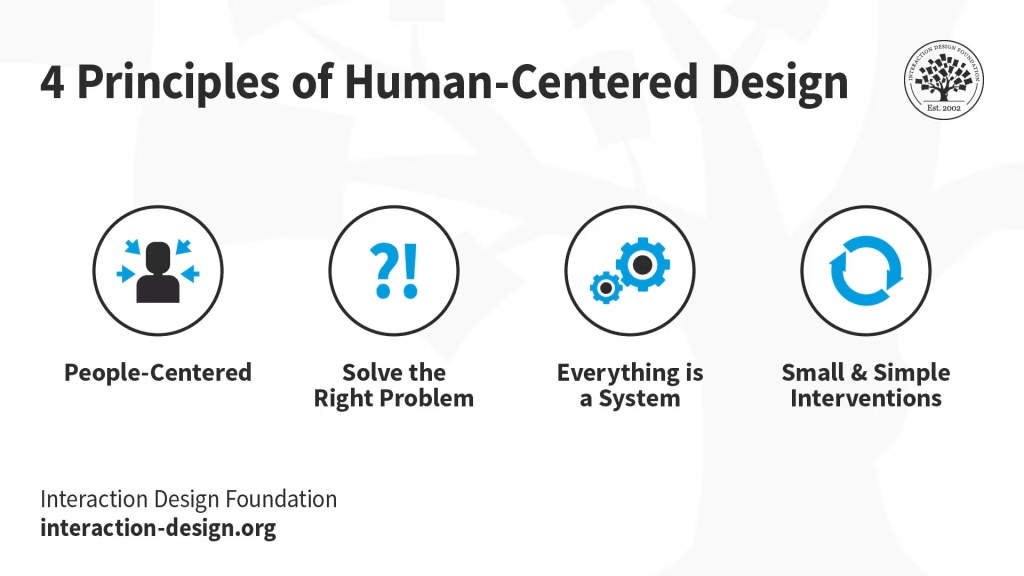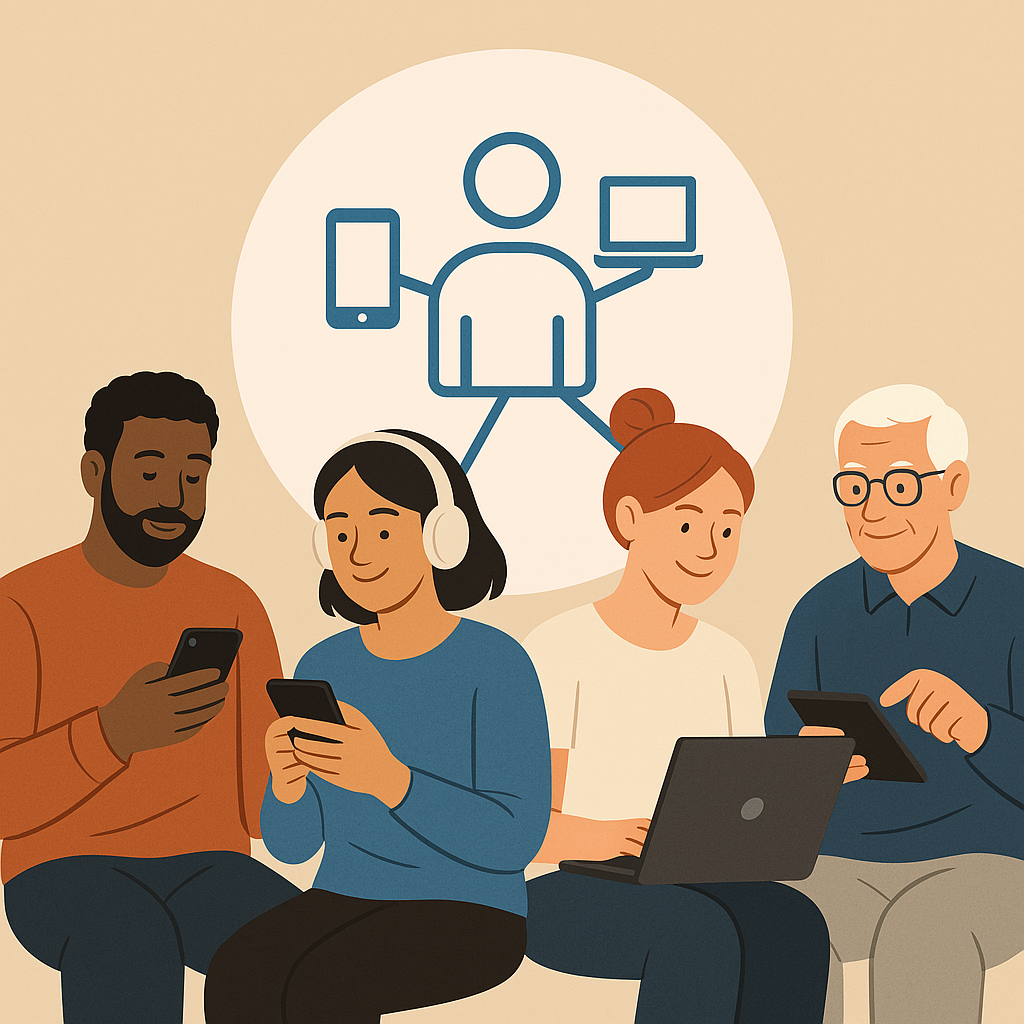Table of Contents
- Human-Centered Technology: What It Really Means
- Why Human-Centered Technology Matters
- Our Approach to Human-Centered Technology
- Real-World Benefits of Human-First Design
- How We Put People First in Our Work
- Additional Resources
- Closing Thoughts
Hello, techno cubs! Welcome to another Thoughtful Thursday, where we explore Gymnarctos Studios’ core values. Today, we’re diving into perhaps our most foundational principle: Human-Centered Technology. 💙
Human-Centered Technology: What It Really Means

Human-centered technology isn’t just about making things that work—it’s about making things that work for people. It sounds simple, right? But you’d be surprised how often this gets overlooked in our tech-obsessed world.
Think about the last time you felt frustrated with a website, app, or game. Maybe the buttons were too small, the instructions unclear, or it just didn’t fit how you naturally think. That’s what happens when technology forgets about the humans using it.
At Gymnarctos Studios, we flip this approach on its head. We don’t ask “How can people adapt to our technology?” Instead, we ask “How can our technology adapt to people?” That shift in perspective changes everything. 🔄

Why Human-Centered Technology Matters
We’re living in a time when technology touches almost every part of our lives. From the moment we wake up (hello, alarm apps!) to how we work, play, connect, and even fall asleep (sleep tracker, anyone?).
When that technology ignores human needs, limitations, or natural behaviors, it creates friction, frustration, and barriers. But when technology is built with humans at the center:
- People feel capable and confident, not confused or left behind
- Technology becomes a helpful companion rather than an obstacle
- Digital experiences feel natural, even intuitive
- The tech works for everyone, not just the technically gifted
- People save time and energy for what really matters to them
Studies show that human-centered design improves user satisfaction by up to 55% and increases user adoption rates by nearly 70%. When people feel seen and understood by technology, they’re more likely to embrace it.
Our Approach to Human-Centered Technology
At Gymnarctos Studios, human-centered technology isn’t just a philosophy—it’s a practice we follow every day. Here’s how we bring it to life:
1. We Start With People, Not Features
Before we write a single line of code or sketch a design, we talk to real humans about their needs, challenges, and how they naturally work. Our feature lists come from real problems that need solving, not the other way around.
2. We Embrace “Less But Better”
We’d rather have five features that work beautifully for people than twenty that overwhelm them. Simplicity isn’t just about having fewer buttons—it’s about creating clarity that helps people feel confident and in control.
3. We Test With Diverse Users
Technology should work for everyone—not just tech enthusiasts, young adults, or people without disabilities. We make sure to include people of different ages, abilities, backgrounds, and tech comfort levels in our testing process.
4. We Design for Emotions, Not Just Tasks
People aren’t robots executing functions—they have feelings, moods, and energy levels that change throughout the day. Our technology acknowledges this human reality by designing for emotional states, not just task completion.
5. We Speak Human, Not Tech
Have you ever read an error message that made absolutely no sense? That’s technology speaking its own language instead of yours. We make sure our communication is clear, helpful, and in plain language that actually makes sense.
Real-World Benefits of Human-First Design
When humans are at the center of technology, everyone wins:
- Users experience less frustration and more joy when using technology
- Businesses see higher engagement and retention when their products respect human needs
- Development teams waste less time building unwanted features when they understand user priorities
- Support teams receive fewer confused questions when products are intuitive
- Society becomes more inclusive when technology works for everyone
How We Plan to Put People First in Our Work
Here’s how we envision applying human-centered thinking in our upcoming projects:
- For our games, we’ll observe how players naturally move and interact, then design controls that feel intuitive rather than forcing players to learn complicated systems
- When developing web applications, we’ll conduct usability testing with people who have varying levels of tech experience to ensure everyone can navigate with confidence
- We’re committed to designing with flexible settings that adapt to different needs—larger text, various color modes, and multiple ways to interact
- Our error messages will explain what happened in plain language and offer clear steps to resolve the issue
- We plan to regularly check in with users after launch to understand how our technology fits into their real lives
Additional Resources
Want to learn more about human-centered technology? These resources are a great starting point:
- Don Norman’s Design of Everyday Things
- Nielsen Norman Group Articles on Human-Centered Design
- Stanford d.school’s Human-Centered Design Resources
- Designing for Emotion by Aaron Walter
- Interaction-Design-Foundation
Closing Thoughts
Technology should never make people feel small, confused, or left behind. At its best, technology amplifies human potential, connects us, and makes our lives better in meaningful ways. This can only happen when we remember that behind every screen tap, mouse click, and voice command is a human being with hopes, frustrations, and needs.
At Gymnarctos Studios, human-centered technology isn’t just what we do—it’s who we are. Because we believe that when technology truly serves humans instead of the other way around, we all thrive. 💙
What about you? Have you experienced technology that felt like it was truly designed with humans in mind? Or have you faced a tech challenge that left you feeling frustrated? I’d love to hear your stories in the comments below!
Tagged: #HumanCenteredDesign, #UserExperience, #GymnarctosStudios, #TechForHumans, #UXDesign, #AccessibleTech, #ThoughtfulThursday, #TechThatCares, #HumanFirst, #Techbear, #InclusiveTech, #ValuesDriven, #GameDesign, #DigitalExperience
